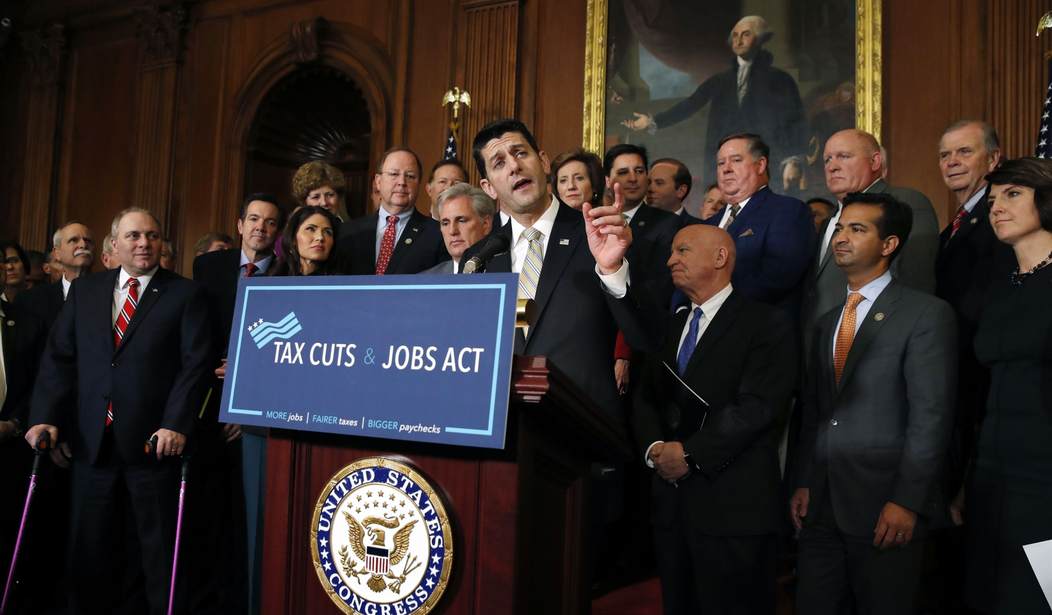As tax reform legislation moves through Congress, the swamp is in a frenzy. An army of lobbyists is marching the halls of Congress in search of one thing: to defend their clients’ special carveouts at any cost. Each might pay lip-service to the need for an overhaul and simplification of the tax code, but all argue that their benefits should be an exception, posing a significant threat to tax reform.
The primary stated objectives of tax reform are to make the tax code less economically destructive (such as by slashing the corporate rate to an internationally competitive level and lowering marginal tax rates on individuals), to simplify it (by eliminating deductions and credits as much as possible), and to provide broad tax relief. The latter is primarily of political importance, but the real long-term benefit will come from the provisions aimed at boosting economic growth like the corporate rate cuts, which in turn means greater job availability and higher wages for years to come.
But none of it will happen if special interests get their way. They are viciously defending every carveout and deduction. If enough of these are not eliminated, then there’s no fiscal room for reforms and cuts while also keeping the legislation compliant with budgetary rules so that it can bypass a Senate filibuster and pass without any Democratic votes.
Pushback started in earnest even before legislative language was released when the National Association of Home Builders and the National Association of Realtors declared war on tax writers for considering the mortgage interest deduction for elimination. It’s one of the biggest distortions in the tax code. It encourages housing bubbles by favoring retail over commercial investment, and also benefits primarily those in the upper income bracket while raising housing costs for everyone else.
Recommended
Ideal tax reform would find a way to eliminate the mortgage deduction, with transition rules if necessary, and plow the savings into lower rates for all. Instead, House tax writers caved to special interest pressure and only lowered the mortgage cap for deductibility from $1 million to $500,000, while the Senate bill doesn‘t currently touch it at all.
Another point of contention is the state and local tax (SALT) deduction, which allows some filers to deduct income paid to their state and local governments from their federal taxes. It benefits at most the 30% of taxpayers who itemize, a population that skews wealthier, but some taxpayers in high tax states—a majority of the value of SALT deductions benefit those in just six states—and their representatives in Washington see it as needed relief from confiscatory state governments.
In contrast, the SALT deduction encourages states to overtax in the first place. When state and local governments can raise taxes without their constituents feeling the full effects, they are able to set rates higher than they otherwise could before suffering electoral blowback. Thanks to the SALT deduction, for instance, the rest of the nation finances roughly 5 percentage points of California’s top-in-the nation 13.3% income tax.
Not every deduction is being defended for narrow, self-interested reasons. Some, like the adoption tax credit, strike a more emotional cord. Nevertheless, achieving an ideal tax code would require doing without it just the same.
Adopting a child is a noble and socially desirable behavior, and of course adoption should be less expensive. That’s an admirable policy goal, but one that can surely be accomplished through other means without mucking up the tax code.
Tax compliance sucks a lot of productivity out the economy and encourages businesses to waste resources lobbying for carveouts instead of pleasing customers. That’s why simplifying the tax code is one of the main reasons for doing tax reform. Simplification means eliminating all the deductions and credits. When no one gets special treatment in the tax code, everyone gets a lower tax burden. In that way it’s not only more efficient, but also fairer.
Of course, Republicans opened themselves up to these attacks by not actually targeting every deduction. They chose instead to expand low-to-middle class handouts like the earned income tax credit and child tax credit. This was done for political rather than economic reasons, as both of these increase complexity while doing nothing for growth, and leaves legislators more vulnerable to attack for not saving other credits and deductions than if they had taken a principled position against all handouts in the tax code. Unfortunately, that makes tax reform very difficult to achieve.
In the grand scheme of things, the adoption credit is not fiscally significant. Restoring it doesn’t immediately threaten the major pro-growth provisions of tax reform. But when it comes to major carveouts like the SALT and mortgage interest deductions, they need to find a stronger backbone. They’re already not taking as principled a position as they should by not aiming to eliminate them entirely. Congress must stand firm and let the special interests complain in order to deliver a much-needed, pro-growth tax reform package.

























Join the conversation as a VIP Member